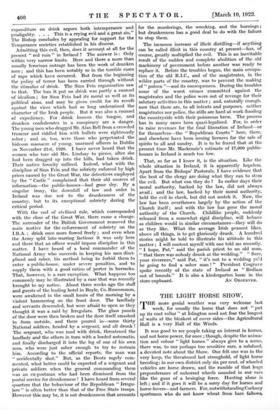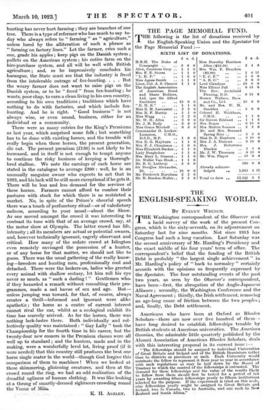THE LIGHT HORSE SHOW.
THE more genial weather was very welcome last week, for usually the horse that does not "put up its coat collar" at Islington need not fear the longest of waits at the bleakest of cover sides—the Agricultural Hall is a very Hall of the Winds.
It was good to see people taking an interest in horses, and not horse power, for once ; though, despite the anima- tion and colour "light horses" always give to a scene, there was, to our perhaps too sensitive ears, a subdued, a devoted note about the Show. One felt one was in the very keep, the threatened last stronghold, of light horse breeding; in our own district only six per cent. of wheeled vehicles are horse drawn, and the rumble of that huge preponderance of unhorsed wheels sounded in our ears like the guns of a besieging force. Hunting alone is left ; and if it goes it will be a sorry day for horses and horse-lovers—and farmers. For, notwithstanding Cockney sportsmen who do not know wheat from bare Mows, hunting has never hurt farming ; they are branches of one tree. There is a type of reformer who has much to say to- day who always refers to " farming " as "agriculture," unless lured by the alliteration of such a phrase as " farming-on factory lines." Let the farmer, cries such a one, grade his apples ; keep pigs on the Danish system ; pullets on the American system ; his entire farm on the hire-purchase system, and all will be well with British agriculture ; and, so he impressively concludes his harangue, the State must see that the industry is freed from the intolerable outrage of fox-hunting. . . . But the weary farmer does not want to raise pigs on the Danish system, or to be " freed " from fox-hunting ; he wants, poor chap, to earn a clean living in his own country, according to his own traditions ; traditions which have nothing to do with factories, and which include fox- hunting. And he is right. "Good business" is not always wise, or even sound, business, either for an individual or a community.
There were as many entries for the King's Premiums as last year, which surprised some folk ; but something has to be done with existing horses, and the trouble will really begin when these horses, the present generation, die out. The present premium (MO) is not likely to be increased, and in itself is not enough to tempt anyone to continue the risky business of keeping a thorough- bred stallion. We note the earnings of each horse are stated in the catalogue to average £860: well, he is an unusually sanguine owner who expects to net that in 1923, and his luck will be still more exceptional if he gets it. There will be less and less demand for the services of these horses. Farmers cannot afford to cumber their pastures with stock for which there is so restricted a market. No, in spite of the Prince's cheerful speech there was a touch of perfunctory ritual—or of valedictory sadness, according to your mood—about the Show. As one moved amongst the crowd it was interesting to contrast its tone with that of an average crowd, say, at the motor show at Olympia. The latter crowd has life, intensity ; all its members are actual or potential owners, and, however technically ignorant, eagerly observant and critical. How many of the sedate crowd at Islington even remotely envisaged the possession of a hunter, or of any horse for that matter, we should not like to guess. There was the usual gathering of the really know- ing—breeders and hunting men, professionally cool and detached. There were the lookers-on, ladies who greeted every animal with shallow ecstasy, let him roll his eye never so much, as "such a darling 1 " Gentlemen who, if they hazarded a remark without consulting their pro- grammes, made a sad havoc of sex and age. But— unless jumping was toward, for that, of course, always creates a thrill—informed and ignorant were alike apathetic ; the horse as a centre of current interest cannot rival the car, whilst as a zoological exhibit its time has scarcely arrived. As for the horses, there was nothing lack-lustre there. Both individually and col- lectively quality was maintained : "Gay Lally" took the Championship for the fourth time in his career, but the twenty-four new comers in the Premium classes were all well up to standard ; and the hunters, made and in the making, were a wonderfully level lot, living proof (if it were needed) that this country still produces the best one horse single seater in the world—though God forgive this comparison of them to machines ! When we looked at these shimmering, glistening creatures, and then at the crowd round the ring, we had an odd realization of the dreadful ugliness of human clothing. It was like looking at a throng of smartly-dressed sightseers crowding round the Venus of Milo,











































 Previous page
Previous page